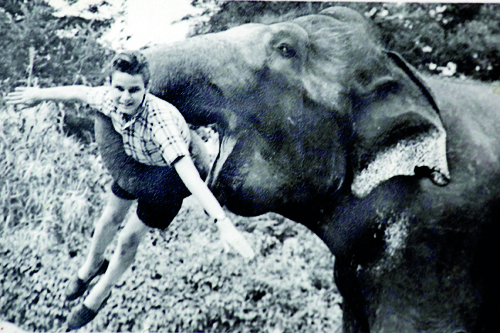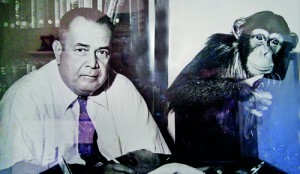Once it was David’s ‘big garden with lots of animals’
He looked deeply into the eyes of one and stood in admiration before another whom he had seen as a tiny baby.
Not only was David Weinman re-tracing the footsteps of his father, he was also venturing back into his own childhood in a nostalgic journey replete with fond memories.

David then: Idyllic days spent in the company of animals just a short walk away from the family bungalow in the zoo premises
Soon after David, now 70, and wife Doreen-Ann landed in Sri Lanka on March 14, one of the first visits they paid was to his “childhood paradise” – the “big garden with lots of animals”.
It was to the National Zoological Gardens at Dehiwela that they went, for David’s Dad had been none other than Major Aubrey Neil Weinman, whose name is inextricably linked to it.
Major Weinman was no nonentity. Of Dutch descent, he had been educated at Royal College, Colombo, fought on the western front as part of the British Army in World War I and been wounded in battle, while in World War II serving in the Far East under the Malaya Command he had been taken prisoner-of-war to be freed only when the boom of the guns was silenced. He had been honoured with an OBE (Order of the British Empire) by the Queen in 1956.
When the Ceylon Zoological Gardens Company on an 11-acre plot at Dehiwela set up by John Hagenbeck, brother of animal trainer, Carl, went bankrupt in 1936, an internet search reveals that the colonial government of Ceylon had acquired it. The Hagenbecks had used the area as a collecting depot for captured wild animals to be sent to European zoos.
Turned into a zoo, Major Weinman was its second Superintendent from 1947 to 1954 and thereafter its first Director from 1954 to 1962 and is credited with accommodating an ever- increasing number of specimens as well as shows, such as the elephant performance and the chimpanzee tea party, which brought in visitors by their thousands.

David now: Nostalgic journey replete with fond memories. Pic by M.A.Pushpa Kumara
For David as a little boy, there could be no other idyll than this – having animals at every turn. A short walk from the bungalow within the zoo premises itself and the world of animals opened up to him.
Recalling that his father’s fondness for animals would have developed as he had had 16 dogs, parrots and numerous other animals, David goes down memory lane when their car would be moved out of the bungalow’s garage and that would be turned into an intensive care unit.
“My mother Ena would get activated and nurse back to health a chimpanzee with bronchitis or become the surrogate mother to a baby elephant too small to be left alone at night,” laughs David, adding that the Director’s bungalow has now been pulled down to make room for more animal enclosures.
The memories flow…..the front lawn of the bungalow, the little orchid house and the summer house and among the visitors, well-known English naturalist and animal collector Gerald Durrell and how his Dad loaned some animals to be included in the movie ‘Bridge on the River Kwai’.
Studying at St. Peter’s College, Bambalapitiya, “where I learnt discipline”, he would come “home” to the zoo where he walked around petting all the animals.
David, the only child of the Weinmans, was in an unspoken-of competition. His father was “fairly strict” and delivered one dictum — that he could roam the zoo after the public had left but could not let the animals out of their cages. He was also not supposed to go anywhere near the two animals classified as most dangerous, the sloth bear with cubs and the Big Cats including the lions, tigers and black

Major Aubrey Weinman at his desk at the Dehiwela Zoo with a faithful at his side
panthers.
However, the boy was bent on competing with his Dad to pet more animals than him……that was the Big Dare he set himself.
“I did pet the beautiful black panther,” says David whose favourite was this Big Cat while his father loved the elephants, adding that in those days the carnivores were fed on six days but not on the seventh to simulate life in the wild.
“I think this practice started by my father is still being followed,” he says, recalling how seeing the well-run Dehiwela Zoo, Major Weinman was invited to help set up Zoo Negara in Kuala Lumpur, Malaysia.
It was also not the only one, for having visited the Dehiwela Zoo and liked the look of it, President Josef Tito of Yugoslavia had also invited him to plan the zoo in Brioni, which he did with no cages but a moat system.
As he and Doreen-Ann were on walkabout in the zoo, guided by three “passionate lady officials”, Additional Director of Operations, Dhammika Malsinghe, Assistant Director Anoma Priyadarshani and Deputy Director (Pinnawala), Renuka Bandaranayake, the “zoo people” were thrilled that he had come a-visiting. The visit had been coordinated by Tissa Jayaweera well-known in business circles having served as the Chairperson of the International Chamber of Commerce, Sri Lanka whose Dad used to visit the Weinmans at the zoo bungalow.
When Tissa sent David the unusual story about the Dwarf Elephant in the wilds of Sri Lanka, which coincidentally was published in the Sunday Times, he had been keenly interested in coming back for a visit.
Referring to bad reports he had read before he came to Sri Lanka, that keepers were stealing food and the zoo was not being run well which made him prejudiced, he says all that was dispelled during his tour.
“I am very impressed with the zoo,” says this self-confessed animal man, who had worked with gorillas at the Taronga Park Zoo in Mosmen, Sydney, as a youth “chopping up bananas and papaya”to feed them so that they would reproduce, soon after his family migrated to Australia after his father’s retirement.
Pointing out that arm-chair do-gooders are highlighting lots of negatives because zoos have gone out of fashion, he says that just because all animals are not fat, does not mean that they are not being fed. Like humans, some animals are thin and some are fat, he argues, debunking the misconception that some animals are eating their young because they are starving.
Mistreatment is another issue that he deals with, adamant that he “looked into the eyes of the monkeys and they looked happy and contented and were not resorting to nervous itching and scratching under their arms”.
In strong defence of zoos, the plus points, according to David are that for many humble men, women and children who cannot afford to go to Yala and Wilpattu National Parks to get close-ups of animals in the wild, a zoo is where they can look at them in wonder and awe. On the part of the animals, they are ensured good food and health-care. “Zoos bring the animals to the people.”
For David, the meeting with majestic ‘Bandula’ at the zoo was very poignant. He remembers his father giving an order to the Pannikiars — Muslim farmers who would turn elephant trappers when called to do so – to catch a baby elephant. It may have been from the Deduru Oya herd for which permits were issued. The Pannikiars would weave strands of sambhur hide together to make a noose with five or six sambhur horns tied at the other end and then run behind a herd in the jungle beating drums and cans.
A baby lagging behind would be expertly noosed, with any attempt at escape being hindered by the sambhur horns getting entangled in the undergrowth.
“We (father and son) used to go with them on their trapping trips and camp there to get the best baby,” he says. And the baby they brought back home to the zoo is ‘Bandula’.
As David assures that had his father been alive (Major Weinman died in Australia in the late 1960s) he would say that the animals at the Dehiwela Zoo are happy, he promises that he will come back to Sri Lanka next year.
Having engaged in a whistle-stop tour of Kandy, Nuwara Eliya and Galle, on Tuesday, David and Doreen-Ann returned to their business of running the ‘Aussie Barbeque & Bar’ on the waterfront in Kota Kinabalu in Sabah and also spending time with son Aden and daughter Tamara-Ann in Australia.
David has been yearning to seek his roots and hankering to come back to Sri Lanka for more than 50 years, says Doreen-Ann, adding that the promise to return next year is one he is sure to fulfil.
| My father the POW
Major Aubrey Weinman was a prisoner-of-war in Singapore, for a short while in Changi and then Seletar for nearly four years. Many people say a lot of bad things about the Japanese and Koreans, says David when asked whether his father ever spoke of those times. There were ruthless ones who resorted to torture and others who were compassionate. “But they were also open to a little paga (bribe),” he says, recounting how a packet of Gillette razors handed over to a Japanese guard could get his Dad “a day out” of the prison. Dad, however, didn’t let me buy toys made in Japan after the war, adds David. ‘I looked after royal baubles’: David He was not a Caliph for a day but an advisor to Prince Jah H.E.H. – Nizam VIII of Hyderabad, a member of India’s former ruling royal family. “I looked after his baubles,” he says and the ‘baubles’ included monstrous bits of jewellery and other objects of art such as water caskets and paan (betel) sets encrusted with huge rubies and emeralds. The highlight of the collection was the world’s largest coin, a 12-kg solid piece minted in 1613 in India, which went under the gavel for £6 million in Geneva, he says, adding that an emerald necklace was sold to famous actress Elizabeth Taylor for US$ 1 million. Another feather in David’s cap was the facilitation of the sale of Falaknuma Palace, one of five palaces of the Nizam which the Taj group has restored to its regal splendour and markets as its premier hotel in India. In fact, David was a guest at ‘Moghul Splendour’ on March 15 at the Taj Samudra Colombo when Hyderabadi chefs were flown here. |



